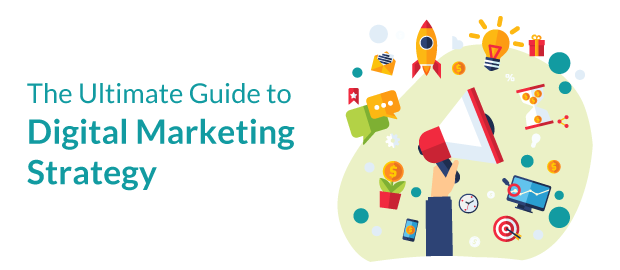
Introduction: Why You Need the Ultimate Guide to Digital Marketing
In the digital-first era, marketing has evolved far beyond traditional billboards and print ads. With billions of people connected online, businesses must adapt to digital platforms to survive and thrive. Whether you’re a startup, a marketing professional, or a business owner, understanding how to harness digital marketing can be the difference between growth and stagnation.
This Ultimate Guide to Digital Marketing is your comprehensive companion to navigating this vast and ever-changing field. From defining the basics to implementing complex strategies, you’ll learn how to build a powerful digital presence that attracts, converts, and retains your ideal audience in 2025.
Chapter 1: What is Digital Marketing?
Digital marketing refers to all marketing efforts that use electronic devices or the internet. Businesses leverage digital channels such as search engines, social media, email, and websites to connect with current and prospective customers.
Unlike traditional marketing, digital marketing allows for two-way communication, personalization, and deep data insights that help businesses tailor their strategies in real-time.
Chapter 2: Core Types of Digital Marketing
Understanding the main channels of digital marketing is essential to building a well-rounded strategy. Below are the most common types:
1. Search Engine Optimization (SEO)
SEO involves optimizing your website content to rank higher in search engine results pages (SERPs). The goal is to increase organic (non-paid) traffic by targeting specific keywords and enhancing the site’s authority through backlinks and technical improvements.
Key Elements of SEO:
- Keyword research
- On-page optimization
- Link building
- Mobile-friendliness
- Page speed optimization
2. Pay-Per-Click (PPC) Advertising
PPC is a paid form of digital marketing where advertisers pay a fee each time their ad is clicked. Google Ads and Facebook Ads are popular platforms. PPC delivers immediate visibility and is ideal for short-term campaigns or product launches.
3. Content Marketing
This strategy focuses on creating and distributing valuable, relevant, and consistent content to attract and retain a clearly defined audience. Common formats include:
- Blog posts
- E-books
- Case studies
- Webinars
- Videos
4. Email Marketing
Still one of the most cost-effective strategies, email marketing is perfect for lead nurturing and customer retention. Personalized, segmented email campaigns yield high engagement when done right.
5. Social Media Marketing
Social platforms like Instagram, LinkedIn, Facebook, and TikTok are essential for brand awareness, engagement, and even direct sales.
6. Affiliate Marketing
In this model, brands partner with third parties (affiliates) who promote their products in exchange for a commission per sale.
7. Influencer Marketing
Using individuals with strong online followings to endorse products builds brand trust and reach — especially effective for Gen Z and millennial audiences.
Chapter 3: Building a Digital Marketing Strategy
Creating an effective digital marketing strategy requires more than just posting on social media or writing a blog. It must be intentional, data-driven, and aligned with your business goals.
Step 1: Define Clear Objectives
Use the SMART framework:
Specific, Measurable, Achievable, Relevant, Time-bound.
Step 2: Know Your Audience
Build customer personas that represent your ideal clients. Include demographics, interests, pain points, and buying behavior.
Step 3: Select the Right Channels
Not every channel is right for every business. B2B brands may focus on LinkedIn, while B2C companies might thrive on Instagram or TikTok.
Step 4: Create a Content Plan
Map out content topics, formats, publishing schedules, and the customer journey stages they target (awareness, consideration, decision).
Step 5: Allocate Your Budget
Distribute your marketing budget across channels based on ROI expectations, business goals, and historical performance.
Step 6: Monitor & Optimize
Use tools like Google Analytics and Meta Ads Manager to track performance and refine campaigns.
Chapter 4: Top Digital Marketing Tools for 2025
Success in digital marketing often depends on the right tools. Here are must-have solutions across various functions:
SEO Tools:
- Ahrefs
- SEMrush
- Google Search Console
Social Media Tools:
- Hootsuite
- Buffer
- Later
Email Marketing Tools:
- Mailchimp
- ActiveCampaign
- Klaviyo
Analytics Tools:
- Google Analytics 4 (GA4)
- Hotjar (user behavior)
- HubSpot CRM
AI Marketing Tools:
- ChatGPT (content & automation)
- Jasper (AI content writing)
- Surfer SEO (content optimization)
Chapter 5: Trends That Will Shape Digital Marketing in 2025
Digital marketing evolves rapidly. Staying ahead of the curve is crucial.
1. AI-Powered Personalization
Marketers are using AI to deliver highly personalized content and product recommendations based on user behavior and preferences.
2. Voice Search Optimization
With the rise of smart speakers and mobile voice assistants, optimizing content for conversational queries is key.
3. Short-Form Video Content
TikTok, Instagram Reels, and YouTube Shorts dominate user engagement. Video must be part of your strategy.
4. Zero-Click Search Results
More search queries now result in Google showing answers directly in the SERP. Focus on featured snippets and structured data.
5. Privacy & Cookieless Tracking
With tighter privacy laws and the decline of third-party cookies, marketers must focus on first-party data collection.
Chapter 6: Common Mistakes to Avoid in Digital Marketing
Even experienced marketers fall into these traps:
- Targeting too broad of an audience
- Ignoring SEO fundamentals
- Posting content without a strategy
- Focusing on vanity metrics over conversions
- Not optimizing for mobile
- Neglecting A/B testing
Chapter 7: How to Launch a Successful Digital Marketing Campaign
Here’s a step-by-step blueprint for a winning campaign:
- Goal Setting: Define what success looks like
- Audience Research: Know who you’re targeting
- Channel Selection: Choose where your audience is most active
- Content Creation: Tailor content for each platform
- Execution: Launch the campaign
- Tracking & Reporting: Use KPIs to measure performance
- Optimization: Tweak campaigns based on results
Chapter 8: B2B vs B2C Digital Marketing
B2B Marketing:
- Longer sales cycles
- Focus on logic and ROI
- Best channels: LinkedIn, webinars, email, whitepapers
B2C Marketing:
- Emotional appeal
- Shorter sales funnel
- Best channels: Instagram, TikTok, YouTube, influencer marketing
Each approach requires a different tone, funnel structure, and content style.
Chapter 9: Case Studies – Digital Marketing in Action
Case Study 1: B2B SaaS Company
A software company used SEO and LinkedIn Ads to generate 400% ROI in 6 months by targeting decision-makers with case studies and webinars.
Case Study 2: D2C Fashion Brand
Through TikTok ads, influencer partnerships, and retargeting email flows, this brand grew revenue by 270% YoY.
Key Takeaway: The right mix of channels and content drives results.
Chapter 10: Future of Digital Marketing
Looking beyond 2025, digital marketing will continue to blend with emerging technologies.
- Augmented Reality (AR): Virtual product try-ons
- Conversational Marketing: Chatbots and real-time engagement
- Blockchain in Ads: Transparency and fraud prevention
- Hyper-Personalization: AI analyzing real-time data for tailored offers
Being adaptable is no longer optional — it’s essential.
Frequently Asked Questions (FAQ)
What is the Ultimate Guide to Digital Marketing?
It’s a comprehensive roadmap covering all major areas of digital marketing including strategy, tools, channels, trends, and tips to help you succeed.
How do I start digital marketing as a beginner?
Begin by learning SEO, content marketing, and social media basics. Then, practice by building campaigns, analyzing results, and refining strategies.
Is SEO still relevant in 2025?
Absolutely. SEO continues to evolve with voice search, AI, and Google algorithm updates. It’s still a foundation of long-term success.
What’s the best digital marketing channel?
It depends on your business type and audience. For fast ROI, PPC might be best. For long-term growth, focus on content and SEO.
Conclusion
The world of marketing has fundamentally changed — and digital is now at its core. This Ultimate Guide to Digital Marketing equips you with the knowledge, tools, and insights needed to thrive in 2025 and beyond. Whether you’re refining your strategy or starting from scratch, the key to success is staying informed, adapting fast, and putting the customer at the center of everything you do.
Ready to take your marketing to the next level?
Start implementing what you’ve learned today — and watch your brand grow tomorrow.
